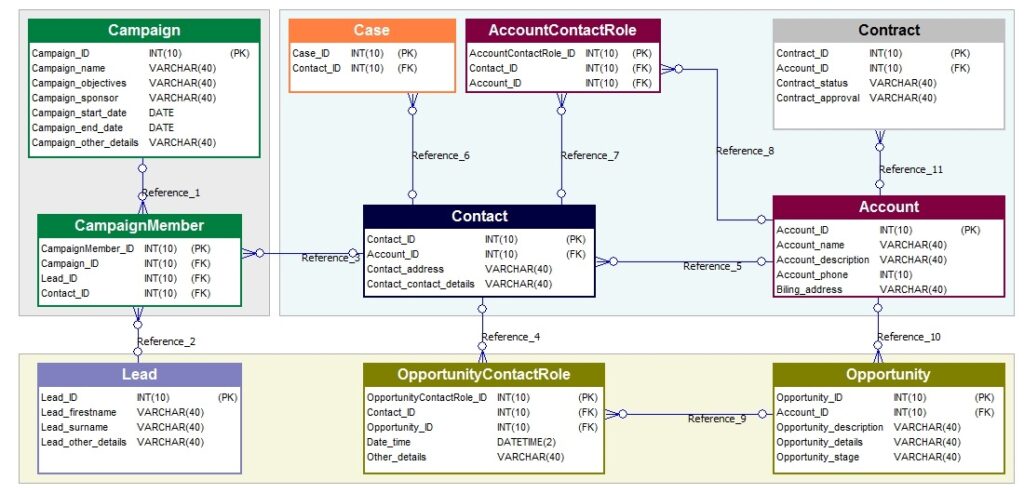Customer Relationship Management (CRM) is a strategy that focuses on building and maintaining strong relationships with customers to drive business growth. SQL, or Structured Query Language, is a powerful tool often used in CRM systems to manage customer data effectively. By leveraging SQL queries, businesses can extract valuable insights from their CRM databases, such as customer preferences, buying behaviors, and interactions. This enables companies to make data-driven decisions, personalize customer experiences, and enhance overall customer satisfaction. By combining CRM with SQL, organizations can optimize their customer relationships and drive long-term success.
Customer Relationship Management (CRM) is a vital strategy for businesses aiming to improve interactions with their customers. By integrating SQL (Structured Query Language) with CRM systems, organizations can manage their customer data efficiently, enhance customer service, and drive sales growth.
Understanding CRM
CRM is a technology that enables businesses to manage customer relationships, streamline processes, and improve profitability. It involves gathering customer data from various sources—marketing, sales, customer service, and more—to build a comprehensive view of each customer. SQL plays a crucial role in managing this data.
The Role of SQL in CRM
SQL is a standard programming language used for managing and manipulating databases. In CRM, SQL allows businesses to create, retrieve, update, and delete customer data efficiently. This capability is essential for organizations that want to maintain accurate and up-to-date customer information.
Benefits of Integrating SQL with CRM
Integrating SQL with your CRM platform offers several advantages:
- Data Management: SQL helps maintain large volumes of customer data quickly and efficiently.
- Advanced Reporting: Leveraging SQL queries enables sophisticated reporting and analytics, providing insights into customer behavior and preferences.
- Data Queries: SQL allows for complex queries, making it possible to segment customers effectively based on various criteria.
- Automation: SQL scripts can automate routine data tasks, enhancing productivity.
Setting Up a CRM Database with SQL
To set up a CRM database using SQL, follow these steps:
- Define Your Tables: Identify the different entities related to your CRM such as customers, contacts, sales, and leads. Create tables for these entities.
- Establish Relationships: Use foreign keys to relate tables, allowing you to connect customers with their transactions and interactions.
- Data Entry: Develop forms for data entry that integrate with your SQL database, ensuring accurate data capture.
- Implement Security: Make sure to set up user permissions to protect sensitive customer data.
SQL Queries for CRM Management
Here are some essential SQL queries that can enhance your CRM system:
1. Retrieving Customer Information
SELECT * FROM customers WHERE status = 'active';This query retrieves all active customers from the database.
2. Analyzing Purchase History
SELECT customer_id, SUM(total_amount) AS total_spent
FROM orders
GROUP BY customer_id
ORDER BY total_spent DESC;This statement helps identify customers who spend the most, allowing targeted marketing efforts.
3. Segmenting Customers by Geography
SELECT city, COUNT(*) AS customer_count
FROM customers
GROUP BY city;This query provides insights into where most customers are located, enabling better geographical targeting for marketing campaigns.
Best Practices for SQL in CRM
To maximize the effectiveness of SQL in your CRM application, consider the following best practices:
- Regular Backups: Backup your database regularly to prevent data loss.
- Normalize Your Database: Normalize your tables to reduce data redundancy and improve data integrity.
- Optimize Queries: Ensure your SQL queries are optimized to reduce loading times and enhance performance.
- Monitor Performance: Use tools to monitor SQL performance and make adjustments as necessary.
SQL Server vs. MySQL for CRM
When choosing a database management system for your CRM, two popular choices are SQL Server and MySQL. Here’s a comparison:
SQL Server
SQL Server is a paid product from Microsoft that offers robust features for enterprise applications:
- Enhanced security features
- Scalability for large datasets
- Integration with other Microsoft products
MySQL
MySQL is an open-source database known for its flexibility:
- Cost-effective for startups and small businesses
- Wide community support
- Access to numerous third-party tools
Cloud-based CRM Solutions with SQL
As businesses increasingly turn to cloud computing, cloud-based CRM solutions that utilize SQL have gained popularity. These platforms offer:
- Accessibility: Access your CRM from anywhere with an internet connection.
- Cost-effectiveness: Lower initial costs as there is no need for extensive hardware.
- Scalability: Easily scale your data storage and resources as your business grows.
Analytics and Reporting in CRM using SQL
Effective analytics and reporting are crucial for understanding customer interactions. Leverage SQL for:
- Customer Behavior Analysis: Use SQL to analyze how customers interact with your product or service over time.
- Sales Trends: Generate reports to assess the effectiveness of sales campaigns and promotions.
- Customer Feedback: Analyze feedback gathered through various channels to improve service quality.
Future Trends in CRM and SQL
The integration of artificial intelligence (AI) and machine learning (ML) in CRM systems will significantly enhance the role of SQL:
- Predictive Analytics: Use SQL combined with AI to predict future customer behavior.
- Personalization: Enable hyper-personalized marketing strategies based on comprehensive customer insights.
- Real-time Data Processing: Implement real-time analytics for immediate customer engagement.
Incorporating SQL into your CRM strategy not only streamlines data management but also enhances customer service. By leveraging the full potential of SQL queries and database management, businesses can foster improved relationships with their customers and drive success in competitive markets.
Customer Relationship Management (CRM) with SQL is a powerful tool that helps businesses effectively manage and analyze customer data to enhance relationships and drive growth. By utilizing SQL for data storage and manipulation, companies can streamline processes, gain valuable insights, and ultimately deliver a more personalized and efficient customer experience.














